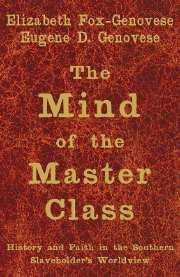Book contents
- Frontmatter
- Contents
- Preface
- List of Abbreviations
- Prologue
- PART ONE CRADLED IN THE STORMS OF REVOLUTION
- PART TWO THE INESCAPABLE PAST
- PART THREE ANCIENT LEGACIES, MEDIEVAL SENSIBILITY, MODERN MEN
- 8 In the Shadow of Antiquity
- 9 Coming to Terms with the Middle Ages
- 10 The Chivalry
- 11 Chivalric Slave Masters
- 12 Chivalric Politics: Southern Ladies Take Their Stand
- PART FOUR A CHRISTIAN PEOPLE DEFEND THE FAITH
- PART FIVE AT THE RUBICON
- Epilogue: King Solomon's Dilemma
- Supplementary References
- Index
9 - Coming to Terms with the Middle Ages
Published online by Cambridge University Press: 05 June 2012
- Frontmatter
- Contents
- Preface
- List of Abbreviations
- Prologue
- PART ONE CRADLED IN THE STORMS OF REVOLUTION
- PART TWO THE INESCAPABLE PAST
- PART THREE ANCIENT LEGACIES, MEDIEVAL SENSIBILITY, MODERN MEN
- 8 In the Shadow of Antiquity
- 9 Coming to Terms with the Middle Ages
- 10 The Chivalry
- 11 Chivalric Slave Masters
- 12 Chivalric Politics: Southern Ladies Take Their Stand
- PART FOUR A CHRISTIAN PEOPLE DEFEND THE FAITH
- PART FIVE AT THE RUBICON
- Epilogue: King Solomon's Dilemma
- Supplementary References
- Index
Summary
The Middle Ages are not a kind of waiting-room between two different worlds, but the age which made a new world, the world from which we come and to which in a sense we still belong. … Medieval Christendom is the outstanding example in history of the application of Faith to Life: the embodiment of religion in social institutions and external forms.
—Christopher DawsonThe forging of a modern slave society without adequate models and precedents challenged the imagination of the South's leaders of public opinion. The novelty of their project seemed to foreclose appeals to historical precedent, and yet the full implications of their own concepts of freedom and equality made useful historical precedents at the same time both necessary and unrealizable. Antiquity had had slave societies, and throughout history most societies, including those of Europe, had included slavery. But in the modern world of expanding capitalism, industrialization, bourgeois individualism, and Enlightenment liberalism, southern slave society appeared increasingly anomalous, the more so since embedded in the world's most democratic republic. For the South to build a modern slave society, no ritualistic defense of the past would serve. An enfranchised nonslaveholding majority found aristocratic pretensions distasteful. The South was rent by competing visions of the good society – the good slave society. Slaveholders who most clearly understood the novelty of the world they were building understood also that it rested on the master-slave relation. Most nonslaveholders – arguably, even in Border States – accepted slavery in principle but often resisted many of its implications, especially the challenge to their Jeffersonian democratic values.
- Type
- Chapter
- Information
- The Mind of the Master ClassHistory and Faith in the Southern Slaveholders' Worldview, pp. 305 - 328Publisher: Cambridge University PressPrint publication year: 2005



